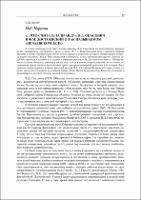Показать сокращенную информацию
«…Что считать за правду»: В.Д. Спасович и Ф.М. Достоевский о так называемом «нечаевском деле»
| dc.contributor.author | Чернова, М.С. | |
| dc.date.accessioned | 2020-09-22T12:34:02Z | |
| dc.date.available | 2020-09-22T12:34:02Z | |
| dc.date.issued | 2010 | |
| dc.identifier.citation | Чернова, М.С. «…Что считать за правду»: В.Д. Спасович и Ф.М. Достоевский о так называемом «нечаевском деле» / М.С. Чернова // Веснік Брэсцкага універсітэта. Серыя 3. Філалогія. Педагогіка. Псіхалогія. - 2010. - № 1. - С. 49 - 56. | ru_RU |
| dc.identifier.issn | 2218-029X | |
| dc.identifier.uri | https://rep.brsu.by:443/handle/123456789/850 | |
| dc.description | In article the performances of barrister V.D. Spasovich on political process on so-called «Nechaev's case» in July 1871 are analyzed. Advocate speeches of Spasovich are entered for the first time in the history of literature and are investigated in a context of historical and literary process of the second half of XIX century. The connection between Spasovich's estimations of figurants of this case and ideas and images of the F.M. Dostoevsky's novel «Demons» is traced. The ideological community of the barrister and the writer not only in the points of contiguity, but in the points of pushing away is found out at their estimations of moral of revolutionary youth and its leaders. The mediated influence of the imaginations of M.E. Saltykov-Shedrin's novel «The History of one city» on a creation of an image demon Peter Verhovensky through Spasovich's speech is proved. Specifications are brought in the comments to the history of creation of the novel of Dostoevsky. | ru_RU |
| dc.description.abstract | В статье анализируются выступления адвоката В.Д. Спасовича на политическом процессе по так называемому «нечаевскому делу» в июле 1871 г. Защитительные речи Спасовича впервые вводятся в литературоведческий обиход и исследуются в контексте историко-литературного процесса второй половины XIX в. Прослеживается взаимосвязь между оценками фигурантов данного судебного процесса Спасовичем и идеями и образами романа Ф.М. Достоевского «Бесы». Обнаруживается идейная общность адвоката и писателя не только в точках соприкосновения, но и в точках отталкивания при их оценках нравственных ориентиров революционной молодежи и ее лидеров. Доказывается опосредованное влияние фантазий романа М.Е. Салтыкова-Щедрина «История одного города» через речь Спасовича на создание образа «беса» Петра Верховенского. Вносятся уточнения в комментарии к истории создания романа Достоевского. | ru_RU |
| dc.language.iso | ru | ru_RU |
| dc.publisher | БрГУ имени А.С. Пушкина | ru_RU |
| dc.relation.ispartofseries | Серыя 3. Філалогія. Педагогіка. Псіхалогія; | |
| dc.title | «…Что считать за правду»: В.Д. Спасович и Ф.М. Достоевский о так называемом «нечаевском деле» | ru_RU |
| dc.title.alternative | «…What can be considered truth»: V.D. Spasovich and F.M. Dostoevsky about so-called «Nechaev's case» | ru_RU |
| dc.type | Article | ru_RU |
